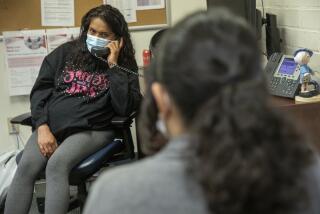More Health-Care Aides Lack Insurance, Study Finds
The number of health-care workers without health insurance is increasing rapidly nationwide and according to an article in the March issue of the American Journal of Public Health, California is among the worst cases.
A Harvard Medical School study analyzed data from 10 years of the Census Bureau’s Current Population Survey and found that from 1988 to 1998, the amount of uninsured health- care personnel rose from 8% to 12% nationally.
“There’s something particularly offensive in saying to a woman who’s working for a hospital that if you get sick or your kids get sick, you’re not going to be able to get the care you need,” said David Himmelstein, one of two doctors and a Harvard Medical School student who conducted the study.
California has the largest number of uninsured health-care workers with 154,000, followed by Texas with 151,000 and New York with 110,000.
“California generally has a pretty poor record of health coverage for health-care workers,” Himmelstein said, citing the state’s large amount of low-wage workers, particularly women and minorities.
Women and minorities surpass the national percentage of uninsured health-care employees, while men and whites are below. The survey said 13% of women workers are uninsured; 21% of blacks; and 25% of Latinos.
Maura Kealey, health policy specialist for Service Employees International Union, said this is particularly poignant in Los Angeles because of the number of Latino workers.
The professions with the highest percentages of uninsured employees are nurses aides, nursing home workers and custodial staff.
“You’d like the health-care industry to practice what it preaches,” said Drew Altman, president of Kaiser Family Foundation, “but the health-care industry is just like any other industry when it comes to low-wage workers.”
The study also found that 10% of uninsured children live in households with a health-care worker, which Himmelstein said surprised him most.
Walter Zelman, president of the California Assn. of Health Plans, said the fact that health-care workers often don’t have health coverage didn’t surprise him, but that he was disappointed.
“It’s not any worse for a low-wage employee in a restaurant to be uninsured than a low-wage employee in a nursing home to be uninsured,” he said.
“They have the same family, the same risks and it’s unfortunate for anyone to be uninsured,” Zelman said.
More to Read
Get the L.A. Times Politics newsletter
Deeply reported insights into legislation, politics and policy from Sacramento, Washington and beyond. In your inbox three times per week.
You may occasionally receive promotional content from the Los Angeles Times.










